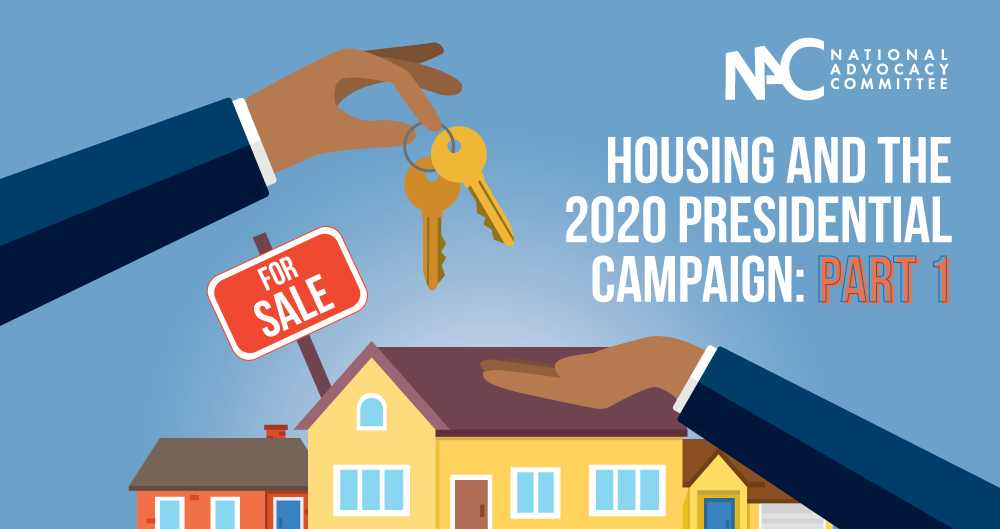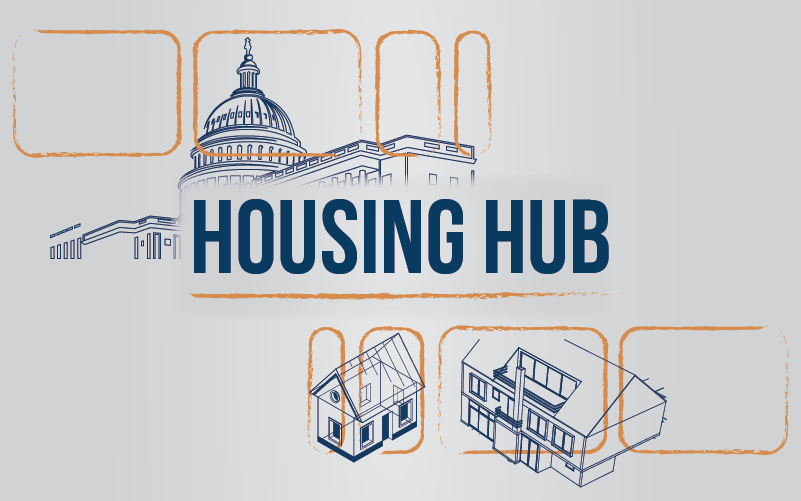2020 Presidential Campaign: Housing Part 1
Celebrating NAHREP familia, cultura, politics, and grassroots action
Qué onda mi gente?!

The Biden Plan for Investing in our Communities through Housing
Biden has proposed spending $640 billion over a 10-year period focused on ensuring Americans have access to affordable, quality housing near job centers. While there is a lot in in this plan, let’s break his positions down by some of the topics we care most about at NAHREP:
What about housing inventory?
- Rehabilitate low cost housing in areas of short supply: $65 billion in new incentives for state housing authorities to construct or rehabilitate low-cost, energy efficient housing in areas of short supply. This money would be tied to communities facing affordability challenges that are willing to change zoning laws.
- Tie transportation funding to the easing of restrictive zoning: Eliminate state and local housing regulations that limit building new homes by tying federal investments for municipalities to getting rid of zoning restrictions. HUD Secretary and Transportation Secretary will be asked to identify existing federal grant programs that can be amended to add zoning reform requirements.
- End exclusionary zoning: Require any state receiving Community Development Block Grants (CDBG) or Surface Transportation Block Grants to develop a strategy for inclusionary zoning. He also plans to invest $300 million in Local Housing Policy Grants to give states and localities the technical assistance and planning support they need to eliminate exclusionary zoning policies and other local regulations that contribute to sprawl.
Noe’s Commentary: You know how we feel about incentivizing municipalities to ease zoning laws so that we can actually build enough housing to meet demand! And, tying transportation funds to ease housing restrictions, was in our policy priorities. So, we will give this section a big thumbs up.
What’s missing? Housing inventory shortages are also caused by a shortage of labor. That is why we need comprehensive immigration reform.
What about access to credit?
- Create a disruptor in credit reporting: Create the Public Credit Reporting Agency to provide consumers with a government credit reporting option that seeks to minimize racial disparities. This includes incorporating non-traditional data like rental history and utility bills to establish credit.
- That’s pretty much it: We need more on access to credit.
Noe’s Commentary: The current credit reporting system is antiquated. We support anything that revamps credit reporting, as this is a huge issue for Latino borrowers who have thin credit files.
What’s missing? Lots when it comes to access to credit, for example the QM rule, the cost of loans at the GSE’s, credit overlays, so much!
What about ending discrimination in housing and advancing minority homeownership?
- Reverse Fair Lending rollbacks and hold banks accountable for discrimination: The proposed plan would reverse the Fair Housing rollbacks seen in 2018 and would hold banks accountable for discrimination, aka disparate impact.
Noe’s Commentary: We’ve written several letters to HUD back in October 2019, asking the administration to do just this. All of the major lenders and trade associations agreed with us including the MBA, NAR, Quicken Loans, among others. To read one of NAHREP’s letters, click here.
- Strengthen and expand the Community Reinvestment Act (CRA): Expand CRA to include “fintechs,” non-bank lenders and insurance companies. Additionally, close loopholes that would allow institutions to avoid lending and investing in all of the communities they serve.
Noe’s Commentary: Just two weeks ago, NAHREP wrote a blog outlining the changes that are happening to CRA and why they aren’t great for communities of color. You can read that blog post here. As far as expanding CRA to fintechs, non-banks and insurance companies, that would mean that companies like Quicken Loans would be subject to CRA.
- First Down Payment Tax Credit: Biden wants to create a $15,000 tax credit called the First Down Payment Tax Credit. This will help homeowners offset the costs of purchasing a home. They would also be able to get an advance on this credit, meaning they could get the help immediately when they buy without having to wait until they file.
Noe’s Commentary: Down payments are becoming an increasingly large hurdle in high cost states, like California, where a lot of Latinos are concentrated. This would help a lot of would-be Latino homebuyers.
What about a protecting homeowners from the impact of COVID-19?
- Establish a Homeowners Bill of Rights: Modeled after California’s Homeowners Bill of Rights. The Bill of Rights would:
- Prevent steering of borrowers to costly loans.
- Prevent foreclosure when homeowner is in process of receiving loan modification.
- Give homeowners a right to sue mortgage lenders who violated these protections.
- Give borrowers the right to a timely notification on the status of their loan modifications and to be able to appeal modification denials.
- Expand protections for renters, including preventing landlords from discriminating against tenants receiving federal housing assistance.
Noe’s Commentary: NAHREP supports the need to protect people from being evicted, given that Latinos have been disproportionately impacted by layoffs during the pandemic. But, we can’t keep kicking the can down the road with eviction moratoriums if we’re not going to also help property owners. Over half of tenants live in housing owned by what is considered a “small landlord”. They also need help to cover losses so that they can make mortgage payments and pay for operational costs.
- Protections from eviction: Passing the Legal Assistance to Prevent Evictions Act of 2020, which will help tenants facing eviction access legal assistance. Biden will also encourage localities to create eviction diversion programs, including mediation, payment plans, and financial literacy education programs.
Noe’s Commentary: Down payments are becoming an increasingly large hurdle in high cost states, like California, where a lot of Latinos are concentrated. This would help a lot of would-be Latino homebuyers.
Anything else?
- Establish a national standard for housing appraisals in order to ensure that appraisers are adequately trained, understand the neighborhoods in which they work and are free of bias. Appraisers will not be subject to pressure from financial institutions under this national standard.
- Good Neighbor Next Door Program: Provide down payment assistance and home purchase discounts for certain individual in the workforce, such as first responders, public school educators, public and national service workers in low-income neighborhoods.
The plan is looooooong. This is just a snapshot of some of the highlights that most closely relate to NAHREP’s mission and priorities. Let us know if you have questions.
Un abrazo familia. Los quiero mucho!

About Noerena Limón
Noerena Limón is NAHREP’s Executive Vice President of Public Policy and Industry Relations. Noerena heads the organization’s policy and advocacy efforts on issues ranging from homeownership, housing inventory, credit access and immigration.
Prior to joining NAHREP, Noerena spent six years at the Consumer Financial Protection Bureau (CFPB) and served as a political appointee under President Obama in the White House Office of Political Affairs.



